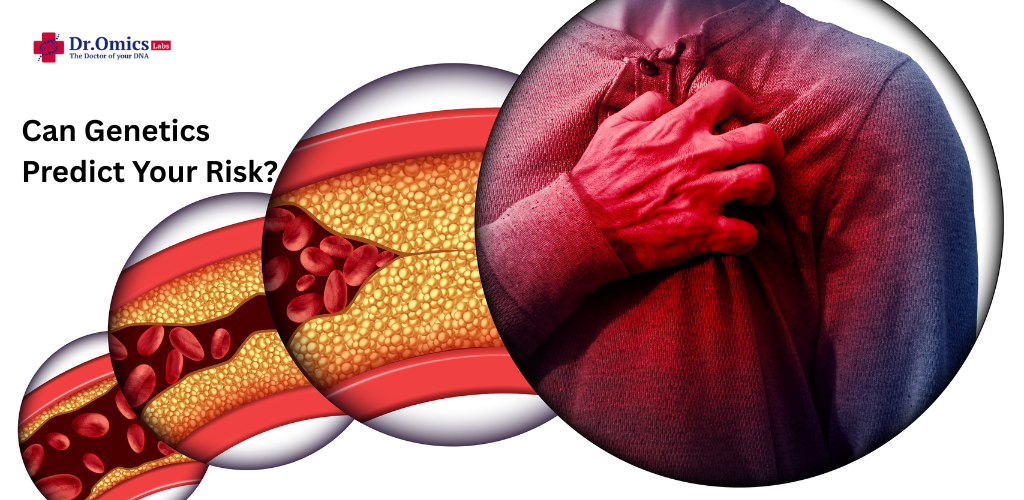Heart Health and DNA Testing: Can Genetics Predict Your Risk?
In an age where technology can map the human genome in hours, the notion that your DNA can predict your heart health isn’t science fiction—it’s fast becoming clinical reality. With cardiovascular diseases (CVDs) continuing to be the leading cause of death globally, the shift toward predictive heart health testing and DNA-based cardiovascular screening has been both necessary and revolutionary (abstract2). But how far can your genes go in forecasting a future heart attack, a sudden arrhythmia, or your response to cholesterol-lowering drugs?
The Genetic Heartbeat: Risk in Your Code
To understand the value of a heart DNA test, we must begin at the molecular level. CVDs can be driven by two major genetic mechanisms: rare mutations in single genes (Mendelian) and common variations in many genes (polygenic) (1). Mendelian forms often result in inherited cardiovascular conditions (ICCs), such as cardiomyopathies, arrhythmias, and familial hypercholesterolemia. These can lead to sudden cardiac death, sometimes without any warning in young individuals (1).
But the majority of adult-onset cardiovascular problems stem from subtle, widespread DNA changes. These common polymorphisms—thousands of tiny tweaks in the genetic code—each add a small increase in risk. Collectively, they form what’s called a polygenic risk score (PRS), a calculated number that represents your inherited vulnerability to conditions like atherosclerosis and coronary artery disease (3).
This PRS is now the centerpiece of genetic heart risk assessment—a statistical snapshot of your genetic burden. When combined with traditional markers like blood pressure and cholesterol levels, this score can elevate risk prediction to a whole new level.
From Prediction to Precision: Personalized Heart Genomics in Action
The future of cardiology lies not in generic treatment plans, but in tailoring care based on individual genetic profiles. This is where personalized heart genomics takes the lead.
Let’s say you’re prescribed statins or clopidogrel after a cardiac event. Some patients respond well. Others don’t—because their bodies metabolize these drugs differently based on their genotypes (1,2). Pharmacogenomics, the study of how genes affect drug response, ensures that you don’t get a drug that’s ineffective or dangerous for you. The best heart genetic test today includes both disease-risk variants and pharmacogenomic markers, making treatment safer and more effective.
Add to this the power of multi-omics—integrating genomics with proteomics, epigenomics, and even microbiome data—and you’re looking at the dawn of precision cardiovascular medicine. Such approaches are already enabling advanced PRS models and identifying previously undetectable risk factors (1).
Should You Get a Heart DNA Test?
If you’re young and healthy, do you need to worry about genetic risk? The short answer: Yes, especially if there’s a family history of heart disease. Early identification of risk through predictive heart health testing can lead to proactive monitoring, lifestyle modification, and preemptive treatment—all of which dramatically reduce mortality (1).
However, this technology isn’t flawless. PRS models are not yet universally reliable, and some high-risk individuals still escape detection. Moreover, environmental and lifestyle factors, such as diet, exercise, and stress, still weigh heavily on outcomes (4). What this means is simple: your genes are a loaded gun, but lifestyle pulls the trigger.
Still, for those who seek clarity and control over their cardiovascular future, DNA-based cardiovascular screening offers a distinct advantage. It’s not about replacing traditional tests—it’s about enhancing them.
Barriers, Breakthroughs, and What Lies Ahead
Despite its promise, genetic heart risk assessment faces obstacles. Cost, access, and lack of awareness continue to limit uptake. In many countries, guidelines on cardiovascular genetic testing are evolving slowly, and the number of specialized genetic counselors trained in cardiovascular genomics is painfully low (1).
Yet the field is expanding at breakneck speed. Tools like CRISPR/Cas9 offer tantalizing possibilities for gene editing, potentially correcting mutations responsible for inherited heart disorders (2). Regenerative medicine, including stem cell therapies, is another rising star, aiming not just to predict or prevent disease but to repair the damaged heart itself (2).
The integration of artificial intelligence into genomics is also revolutionizing how PRS is calculated, moving from mere association toward causal inference. We are on the cusp of turning vast genetic data into actionable insights that could save millions.
Final Pulse: Genetics Isn’t Destiny, But It’s a Powerful Map
In the end, a heart DNA test won’t predict your future with absolute certainty—but it will illuminate the paths most likely to unfold. Combined with traditional diagnostics, it adds layers of precision and foresight that were unimaginable just a decade ago. As science pushes forward, the best heart genetic test will not only predict disease but help prevent it, personalize treatment, and even guide recovery.
Genetics may not be destiny, but in the age of personalized heart genomics, it’s the most powerful map we’ve ever had.
References:
- Bliden, K., Singh, S., Shanoada, R., Kalia, I., Tantry, U., Zimmerman, A., Babu, A. D., Raghavakurup, L., Stude, T., Sidorski, D., & Gurbel, P. (2024). Genetics in the diagnosis and treatment of cardiovascular diseases. Journal of Translational Genetics and Genomics, 8(2), 186–206. https://doi.org/10.20517/jtgg.2023.59
- Safdar, M., Ullah, M., Wahab, A., Hamayun, S., Rehman, M. U., Khan, M. A., Khan, S. U., Ullah, A., Din, F. U., Awan, U. A., & Naeem, M. (2023). Genomic insights into heart health: Exploring the genetic basis of cardiovascular disease. Current Problems in Cardiology, 49(1), 102182. https://doi.org/10.1016/j.cpcardiol.2023.102182
- Jacob, E. O., & Hegele, R. A. (2023). How reliable are polygenic risk scores for risk prediction in patients with heart disease? Expert Review of Molecular Diagnostics, 23(2), 105–107. https://doi.org/10.1080/14737159.2023.2176753
- Vrablik, M., Dlouha, D., Todorovova, V., Stefler, D., & Hubacek, J. A. (2021). Genetics of Cardiovascular Disease: How Far Are We from Personalized CVD Risk Prediction and Management? International Journal of Molecular Sciences, 22(8), 4182. https://doi.org/10.3390/ijms22084182




